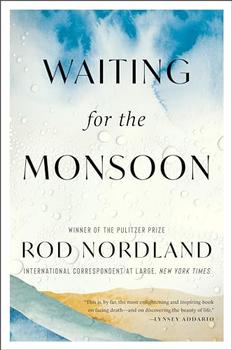Summary | Excerpt | Reviews | Beyond the Book | Readalikes | Genres & Themes | Author Bio

Nothing could have cheered me up more. It was only days until my 70th birthday. "Well," I thought, "I could learn to love this tumor."
The age-flattering toe-tag was, it would turn out, the first of several silver linings caused by the stunning impact of this cerebral intruder in my life. They say that people who survive malignancy of this magnitude approach it with a positive attitude, and I was determined to be one of them, not a victim swept along by bad weather and worse luck.
The next day, I was medevacked by the Times from India to NewYork–Presbyterian Hospital's Weill Cornell Medical Center, one of the best hospitals in America.
Back in India, the monsoon was in full swing, once again, as from time immemorial ...
The rains were inundating the fields of the farmers who have to feed a billion mouths. Those brown fields were green again, and the floods devastated some areas.
The sheets of rain would eventually drain off into the Arabian Sea, whence they came, or into the Andaman Sea to the east, to which they had been bound.
As for the ebbing of the space-occupying intruder in my head, that remained to be seen. From 3 to 6 percent of glioblastoma patients are cured; one of them will bear my name. I've already ordered a T-shirt with a giant 6 and a percent sign on it.
The monsoon lasts all summer, so it is raining in India as I write this. In the meantime, I am teaching myself to love my tumor. Hopefully, love it to death (its, not mine). It has not just made me younger by about 23 years, in toe-tag time, but it has made me better, somehow stronger, funnier, even kinder, more tolerant. Ask anyone who has seen me lately.
I think of my tumor cells as a hawks' boil—the collective noun for two or three raptors when they circle their prey. And when my oncologists come around to discuss the progress of this disease, to them I assign a collective noun that I had underlined, thrice, presciently, in my journal: "a shrewdness of apes."
In the Weill Cornell shrewdness troop, Dr. Phil Stieg is an alpha male, chairman of neurology and neurosurgeon-in-chief. He was my brain surgeon and there was from him no politely indirect talk of space-occupying lesions. His bluntness came as a refreshing breeze. "It's a glioblastoma multiforme," he declared, naming the worst, most aggressive of brain tumors, "and I'm taking it out right away."
He sawed right in and resected what he said was 99.99 percent of it from my brain's right parietal lobe. The remaining 0.01 percent will be radiated and treated with chemotherapy just in case.
"We're on a journey," he said.
Dr. Stieg has a podcast, the title of which I have borrowed for my current journal, which opens on my 70th birthday, which was also the day Dr. Stieg operated: "This Is Your Brain." I'm done with waiting for the monsoon.
Excerpted from Waiting for the Monsoon by Rod Nordland. Copyright © 2024 by Rod Nordland. Excerpted by permission of Mariner Books. All rights reserved. No part of this excerpt may be reproduced or reprinted without permission in writing from the publisher.
At times, our own light goes out, and is rekindled by a spark from another person.
Click Here to find out who said this, as well as discovering other famous literary quotes!
Your guide toexceptional books
BookBrowse seeks out and recommends the best in contemporary fiction and nonfiction—books that not only engage and entertain but also deepen our understanding of ourselves and the world around us.